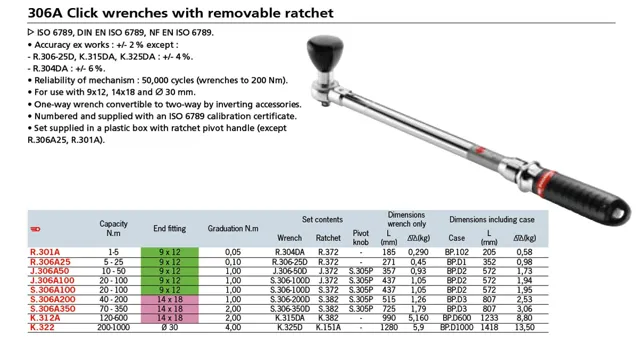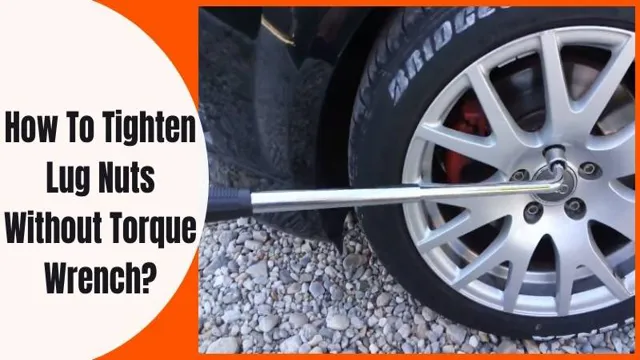Do You Need Special Sockets for Torque Wrench? Essential Tips to Follow

As the saying goes, “use the right tool for the job.” This statement holds particularly true when it comes to torque wrenches. You might have the most accurate and high-quality torque wrench at your disposal, but if you’re using the wrong socket, it won’t do you any good.
Choosing the proper socket size and type is crucial for achieving accurate torque readings and preventing damage to bolts and fasteners. Failure to use the correct socket could lead to bolt rounding, stretching, or even breakage. Think of using the wrong socket as trying to fit a square peg into a round hole.
It just doesn’t work and can lead to disastrous results. Similarly, using an ill-fitting or incorrect socket can sabotage your efforts to achieve the perfect torque level, making all your hard work go to waste. In this blog post, we’ll explore how to choose the right socket, why it’s important, and how to avoid common mistakes.
By the end of this guide, you’ll know precisely which socket to use for your torque wrench and be able to achieve the perfect torque every time.
How Torque Wrenches Work
“Do you need special sockets for torque wrench?” is a commonly asked question among those who are just starting out with torque wrenches. While there are certain types of sockets that are designed specifically for torque wrenches, it is not always necessary to use them. As a rule of thumb, it is recommended to match the drive size of the torque wrench to the drive size of the socket.
Additionally, it is important to use sockets that can handle the torque specifications of the wrench itself. The good news is that most well-made sockets will work just fine with a torque wrench. However, if you are working on a project that requires high precision or tight tolerances, it may be worth investing in specialized sockets designed for use with torque wrenches.
Ultimately, whether or not you need special sockets for your torque wrench depends on the level of precision required for your specific project.
Explaining the Mechanics of Torque Wrenches
Torque wrenches are essential tools used to tighten bolts and nuts to specific limits without concerns of overtightening or undertightening. They work by utilizing a predefined amount of torque or tension needed to fasten bolts and nuts. The mechanics of torque wrenches allow them to apply a precise amount of torque to a bolt or nut, thereby ensuring that it is safely and securely fastened.
These tools come in various types and can be either manual or digital. In manual torque wrenches, a spring is responsible for producing the necessary torque, while digital torque wrenches have a built-in sensor that monitors the torque applied. The amount of torque is displayed digitally, making it easier for users to read and track.
Furthermore, the handle’s length is a critical factor that determines the torque applied when using a torque wrench. The longer the handle, the more torque can be applied. The accuracy and effectiveness of torque wrenches depend on regular calibration.
Improper maintenance or calibration can cause the tool to provide inaccurate torque readings, leading to faulty fastening and potential safety issues. In summary, torque wrenches make it easier to accurately tighten bolts and nuts to the correct torque amount, thereby increasing safety and efficiency while working.

Selecting the Right Socket for Your Torque Wrench
When it comes to using a torque wrench, selecting the right socket is crucial. While you can technically use any socket, it is recommended to use a socket specifically designed for torque wrenches. These sockets are constructed to handle the high forces that come with torqueing, ensuring accuracy and safety.
They also typically have a longer shank to provide more clearance and prevent damage to the wrench or bolt head. Additionally, torque wrench sockets often have markings or color-coded rings to easily identify the torque range for which they are intended. So, while you don’t necessarily need special sockets for your torque wrench, using them will ensure the best results and prolong the life of your tools.
Understanding Socket Sizes and Types
When it comes to selecting the right socket for your torque wrench, understanding socket sizes and types is crucial. Socket sizes typically range from ¼ inch to 1 inch, and the right size socket will depend on the size of the nut or bolt you are working with. It’s also important to consider the type of socket, such as a deep socket for getting into tight spaces or a spark plug socket for removing spark plugs.
The material of the socket can also make a difference in its durability and strength. Stainless steel and chrome vanadium are popular options for sockets. Remember, using the wrong size or type of socket can lead to stripped or damaged nuts or bolts, so take the time to select the right one for the job at hand.
Determining the Correct Socket Size for Your Project
When it comes to selecting the right socket for your torque wrench, the first step is to determine the correct socket size for your project. This may seem like a daunting task, but it’s actually quite simple. All you need to do is find the bolt or nut that you are working on and measure its diameter.
Once you have this measurement, you can select the socket size that corresponds with it. Keep in mind that it’s always better to err on the side of caution and select a socket that is slightly too large rather than too small. Using a socket that is too small can lead to rounding off the edges of the bolt or nut, while using a socket that is too large can lead to slippage and inaccurate torque readings.
So, take the time to measure your bolt or nut and ensure that you select the correct socket size for your project. Your torque wrench will thank you for it!
Choosing the Right Material for Your Socket
When it comes to choosing the right socket for your torque wrench, there are various factors to consider. One of the most critical factors is the material used to make the socket. There are different materials used for making sockets, including chrome vanadium, chrome-molybdenum, and impact-rated materials like black oxide-coated steel.
Chrome vanadium is the most common material and is ideal for light-duty applications. If you need a socket for heavy-duty applications, go for chrome-molybdenum. It’s a stronger material and can handle high torque levels.
Impact-rated materials like black oxide-coated steel are designed to handle heavy-duty applications, allowing you to use your wrench with an impact driver. Ultimately, the material you select depends on the kind of work you intend to do. By selecting the right socket, you’ll be able to get the most out of your torque wrench and complete your projects quickly and efficiently.
Benefits of Using the Right Socket with Your Torque Wrench
Do you need special sockets for a torque wrench? The answer is yes! Using the right socket with your torque wrench can greatly improve the accuracy of your torque readings and prevent damage to your equipment. Ordinary sockets made for hand tools are not designed to handle the extreme forces that a torque wrench can produce. Special sockets for torque wrenches have a thicker wall which can withstand the pressure.
They also have a square drive hole that is precisely dimensioned to fit the male end of the torque wrench properly, allowing for maximum transfer of torque. Using an improper socket can lead to inaccurate readings, causing incorrect torque values to be applied to bolts and fasteners. This can result in damaged parts, stripped out bolts, and even serious injury.
Therefore, using the right socket with your torque wrench is crucial for ensuring that your work is done accurately and safely.
Ensuring Accurate Torque Levels and Tightening Strength
Using the right socket with your torque wrench can have a significant impact on the accuracy of your tightening strength. By selecting the appropriate socket size and type, you can ensure that your torque wrench delivers accurate results every time. This not only helps you avoid over-tightening or under-tightening bolts and nuts but also ensures that your equipment’s components are held tightly in place, minimizing the risk of damage or failure.
Proper socket selection also helps you get the most out of your torque wrench, preserving its lifespan and avoiding the need for costly repairs or replacements. So, take the time to choose the right socket for your torque wrench and always prioritize accuracy and safety when undertaking any bolt tightening job.
Protecting Your Tools and Equipment from Damage
If you’re working with a torque wrench and need to tighten or loosen bolts, using the right socket can make a world of difference. Torque wrenches apply precise amounts of force to bolts to ensure they’re tightened to the correct specifications. However, using the wrong socket can lead to damage to both your tool and the bolt, potentially causing painful and costly repairs.
By choosing the appropriate socket for your torque wrench, you can ensure a proper fit and prevent slippage, reducing the risk of damaging your equipment. It’s like trying to put a square peg into a round hole; it won’t fit, and you’ll end up with unnecessary frustration and the potential for costly damages. So, take the time to select the right socket for your torque wrench and protect your tools and equipment.
Conclusion: Always Use the Right Socket for Your Torque Wrench
In the end, using specialized sockets for a torque wrench is not just a gimmick or a marketing ploy. These sockets are designed to handle higher stress and provide greater accuracy, ultimately ensuring that your projects are completed safely and more efficiently. Think of them like the Michael Jordan of sockets – sure, any socket can technically “play the game,” but with a specialized torque wrench one can really take their skills and performance to the next level.
So don’t skimp on the sockets, invest in quality ones to maximize the potential of your torque wrench and make your projects truly slam dunk-worthy.”
FAQs
What is a torque wrench used for?
A torque wrench is a tool used for measuring and applying a specific amount of torque to a fastener.
Can a torque wrench be used with any socket?
No, not all sockets are suitable for use with a torque wrench. Special sockets with specific design features, such as thicker walls, may be required to ensure accurate torque readings.
Do different torque wrenches require different sockets?
Yes, different types of torque wrenches may require different types of sockets. For example, a click-type torque wrench may require sockets with a different shape than a beam torque wrench.
Can you use standard sockets with a digital torque wrench?
It depends on the specific digital torque wrench and the manufacturer’s recommendations. Some digital torque wrenches may require special sockets to ensure accurate readings.
What size socket do I need for my torque wrench?
The size of the socket needed for a torque wrench will depend on the size of the fastener being tightened. Most torque wrenches will have a specific socket size indicated on the tool or in the product instructions.
Do you need to use a specific socket brand with a torque wrench?
No, there is no specific socket brand required for use with a torque wrench. However, it is important to ensure that the socket is the correct size and type for the wrench being used.
Can you use impact sockets with a torque wrench?
Generally, impact sockets should not be used with a torque wrench as they are not designed to provide accurate torque readings. Instead, special torque sockets should be used to ensure consistent and precise torque application.



